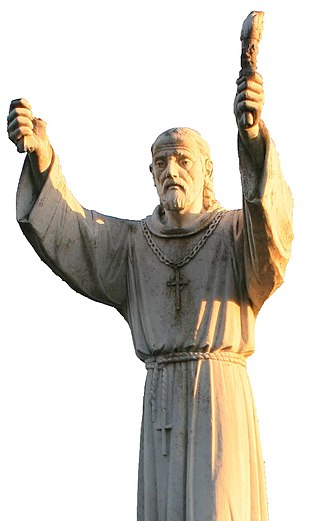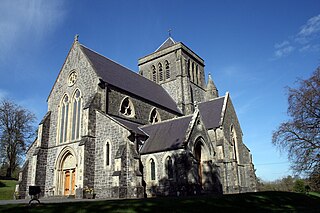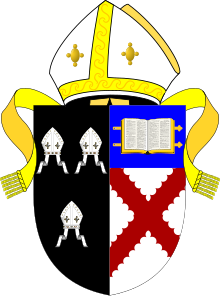The Diocese of Meath is an Irish diocese which took its name after the ancient Kingdom of Meath. In the Roman Catholic Church it still exists as a separate diocese, but in the Church of Ireland it has been united with other dioceses.

The Synod of Ráth Breasail was a synod of the Catholic Church in Ireland that took place in Ireland in 1111. It marked the transition of the Irish church from a monastic to a diocesan and parish-based church. Many present-day Irish dioceses trace their boundaries to decisions made at the synod.

Finnian of Clonard – also Finian, Fionán or Fionnán in Irish; or Finianus and Finanus in its Latinised form (470–549) – was one of the early Irish monastic saints, who founded Clonard Abbey in modern-day County Meath. The Twelve Apostles of Ireland studied under him. Finnian of Clonard is considered one of the fathers of Irish monasticism.
The Bishop of Killaloe is an episcopal title which takes its name after the town of Killaloe in County Clare, Ireland. In the Roman Catholic Church it remains a separate title, but in the Church of Ireland it has been united with other bishoprics.

Clonard Abbey was an early medieval monastery situated on the River Boyne in Clonard, County Meath, Ireland.

The Diocese of Meath is a Latin Church diocese of the Catholic Church that is located in the middle part of Ireland. It is one of eight suffragan dioceses of the ecclesiastical province of Armagh. Thomas Deenihan has been bishop of the diocese since 2 September 2018.

The Archdiocese of Dublin is a Latin Church ecclesiastical territory or archdiocese of the Catholic Church located in the eastern part of Ireland. Its archepiscopal see includes the republic's capital city – Dublin. The cathedral church of the archdiocese is St Mary's Pro-Cathedral. Dublin was formally recognised as a metropolitan province in 1152 by the Synod of Kells. Its second archbishop, Lorcán Ua Tuathail, is also its patron saint.
The Bishop of Achonry is an episcopal title which takes its name after the village of Achonry in County Sligo, Ireland. In the Roman Catholic Church it remains as a separate title, but in the Church of Ireland it has been united with other bishoprics.

The Bishop of Ardagh was a separate episcopal title which took its name after the village of Ardagh, County Longford in Ireland. It was used by the Roman Catholic Church until 1756, and intermittently by the Church of Ireland until 1839.

The United Dioceses of Dublin and Glendalough is a diocese of the Church of Ireland in the east of Ireland. It is headed by the Archbishop of Dublin, who is also styled the Primate of Ireland. The diocesan cathedral is Christ Church Cathedral, Dublin.

The Bishop of Kilmore is an episcopal title which takes its name after the parish of Kilmore, County Cavan in Ireland. In the Roman Catholic Church it remains a separate title, but in the Church of Ireland it has been united with other bishoprics.

The Bishop of Ferns is an episcopal title which takes its name after the village of Ferns in County Wexford, Ireland. In the Roman Catholic Church it remains a separate title, but in the Church of Ireland it has been united with other bishoprics.

The Bishop of Ossory is an episcopal title which takes its name after the ancient of Kingdom of Ossory in the Province of Leinster, Ireland. In the Roman Catholic Church it remains a separate title, but in the Church of Ireland it has been united with other bishoprics.
The Bishop of Meath is an episcopal title which takes its name after the ancient Kingdom of Meath. In the Catholic Church it remains as a separate title, but in the Church of Ireland it has been united with another bishopric.

The Bishop of Kildare was an episcopal title which took its name after the town of Kildare in County Kildare, Ireland. The title is no longer in use by any of the main Christian churches having been united with other bishoprics. In the Roman Catholic Church, the title has been merged with that of the bishopric of Leighlin and is currently held by the Bishop of Kildare and Leighlin. In the Church of Ireland, the title has been merged with that of the bishopric of Meath and is currently held by the Bishop of Meath and Kildare.
The Bishop of Cloyne is an episcopal title that takes its name after the small town of Cloyne in County Cork, Republic of Ireland. In the Roman Catholic Church, it is a separate title; but, in the Church of Ireland, it has been united with other bishoprics.
The Archbishop of Dublin is the head of the Archdiocese of Dublin in the Catholic Church, responsible for its spiritual and administrative needs. The office has existed since 1152, in succession to a regular bishopric since 1028. The archdiocese is the metropolitan see of the ecclesiastical province of Dublin, and the archbishop is also styled the Primate of Ireland. The cathedral church of the archdiocese is Saint Mary's Pro-Cathedral in Dublin city, although the Church formally claims Christ Church as its cathedral, and the archbishop's residence is Archbishop's House in Drumcondra.

The Cathedral Church of St Patrick, Trim is a cathedral of the Church of Ireland in Trim, County Meath, Ireland. Previously the cathedral of the Diocese of Meath, it is now one of two cathedrals in the United Dioceses of Meath and Kildare which is part of the ecclesiastical province of Dublin.
The Roman Catholic Diocese of Clonard was a medieval diocese in Ireland until its 1202 suppression, which became a modern Latin Catholic titular see.
The Lord Bishop of Leighlin was a separate episcopal title which took its name after the small town of Old Leighlin in County Carlow, Ireland.














